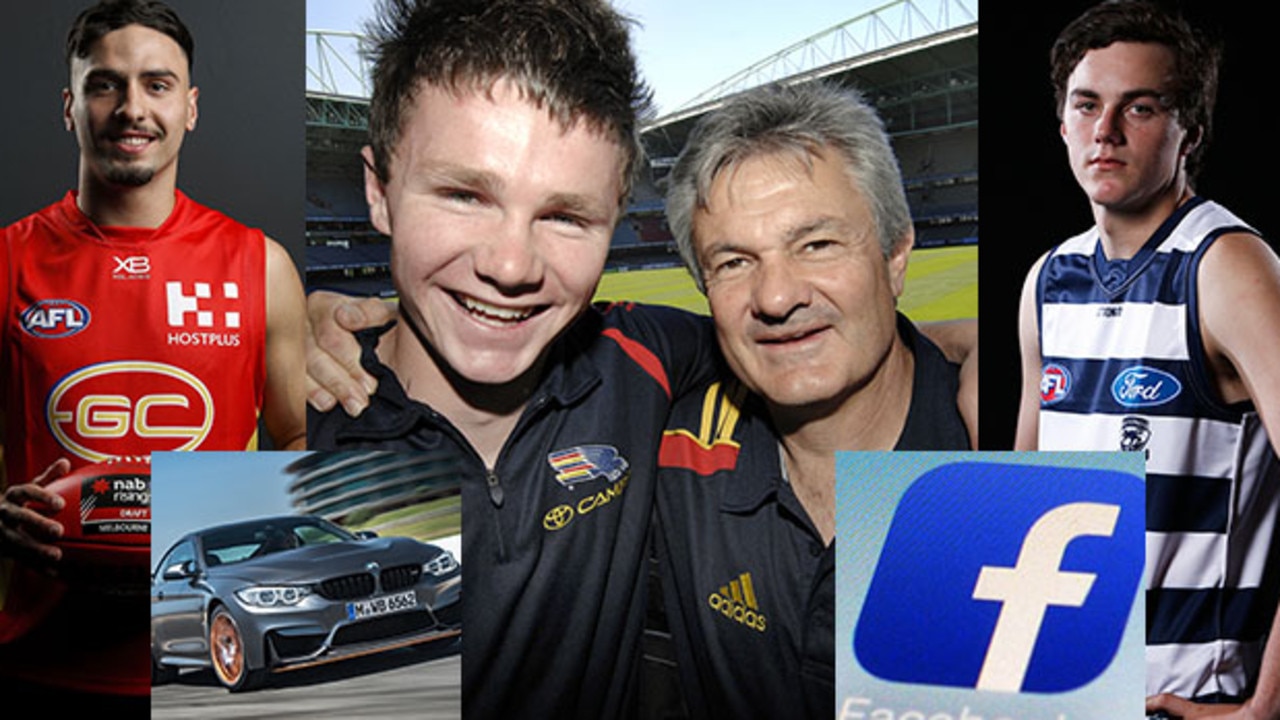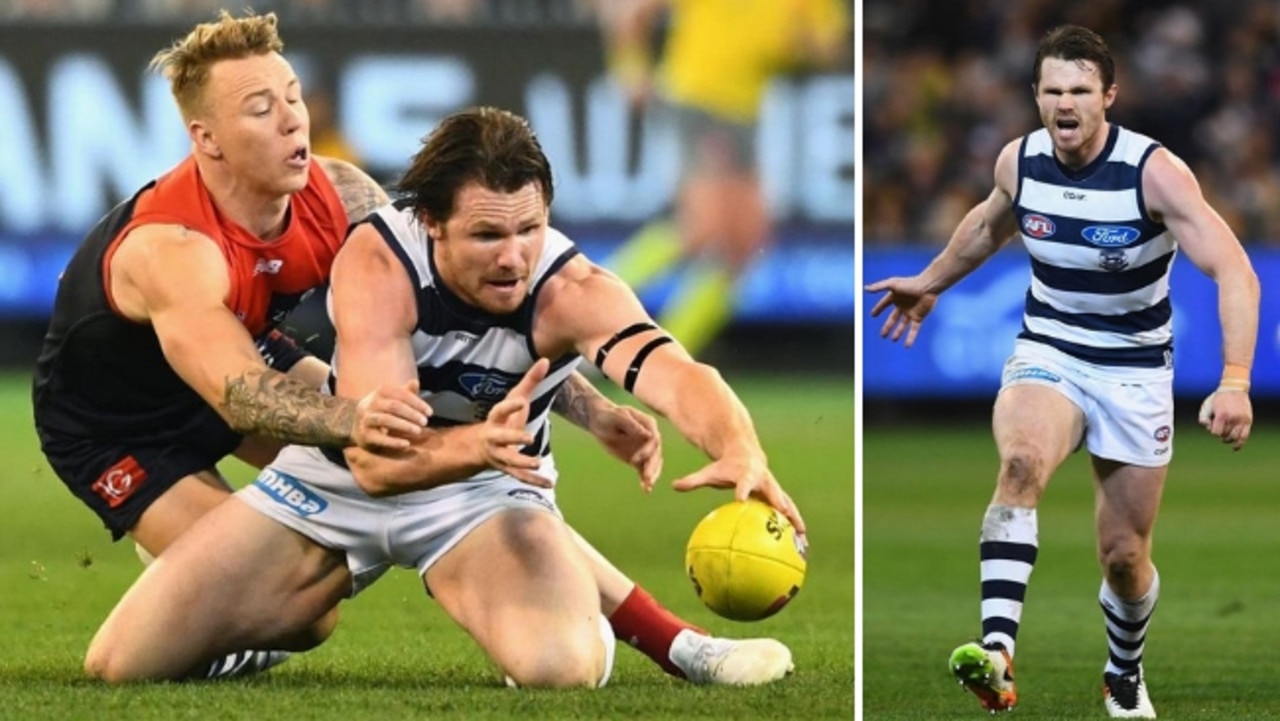Patrick Dangerfield opens up about the young kids who inspire him on the football field
PATRICK Dangerfield has just about done everything there is to do on the football field. But there is a group on youngsters from Anglesea who have demonstrated even more fight than him.
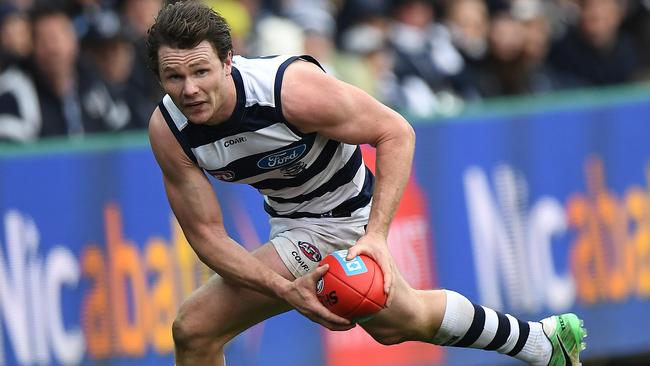
Patrick Dangerfield
Don't miss out on the headlines from Patrick Dangerfield. Followed categories will be added to My News.
EACH of their stories are remarkable in their own right.
It’s 6pm on Thursday night at the Anglesea Football Club and the seven kids sitting around the table are all smiling.
They do that a lot. There is more smiling than talking given English isn’t their first language.
Two are from Thailand, two from Congo with the others coming from South Sudan, Kenya and Afghanistan.
21ST CENTURY FOOTY: THE BEST QUOTES OF THE PAST 17 YEARS
HIRD: WHY THE AFL SHOULD GET DUSTY TO THE SUNS
ROBBO: NICKY DAL ON LIFE AFTER FOOTY, JOEY AND ROOEY
They’re all members of Anglesea’s Under 18 team.
When asked what it means to them to be sitting here in the Kangaroos’ clubrooms, the answer is the same.
“It feels like home,” Andrew says.
He is Congolese who came to Australia via Malawi last year and found his way to North Geelong.
“When I first arrived I would spend all day in the house and didn’t have a single friend,” he said. “This is my family now.”
He explains how his mother didn’t want him to play soccer because she feared he might break a leg yet he got the green light to try Aussie Rules.
This gets more laughter around the table.
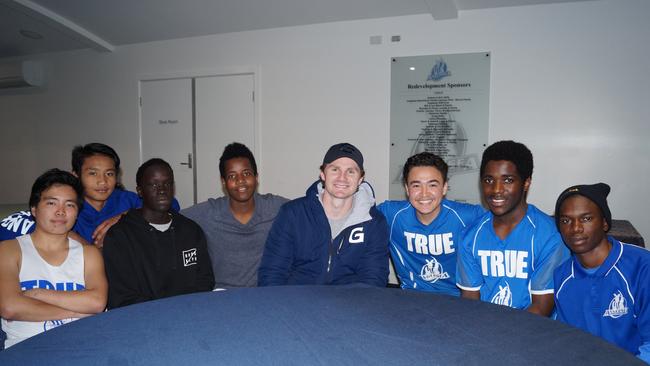
“I’m more grown up now and she can’t say don’t do this don’t do this,” he says. “It’s better I do something rather than just stay at home.”
Mustafa is from Afghanistan, he arrived in 2014 with his mother and two sisters.
They were forced to flee their homeland after his father was killed by the Taliban.
“The way we lived, we didn’t have any rights, we didn’t have nothing as other people had,” he explains.
“Where I lived we weren’t considered as human beings and if they catch us they will probably execute us just because of our look and our beliefs.
“My dad was a soldier, he got caught one day and he got killed by the hands of the Taliban.”
The family knew Mustafa would be next if they didn’t leave so they fled to neighbouring Pakistan and then onto Australia.
You’d think trying to learn a game like Australian rules football would be hard for Mustafa but he’d learnt a lot harder skill at home ... catching eagles.
It turns out that as part of his people’s religious tradition, they would catch eagles and then keep them at their homes before releasing them later on.
“We would make a hole in the ground where we would hide with bush all around us so the eagle couldn’t see us,” he explains.
“We’d have a live pigeon in our hand which we’d hold up and wait for the eagle to come down from the mountain.
“They’d fly past once when they first saw it and then on the second time they would come to take the pigeon and you’d have a chance to pull the eagle down and capture it.”
While their stories of survival across the other side of the world are simply remarkable, the way these kids came to be part of the community by kicking Sherrins around the seaside Victorian town of Anglesea is pretty amazing also.
The local club was down on numbers and looking to recruit. The popularity of music festivals within the area always proves a challenge drawing players away on a number of weekends each year. Perhaps the reason dad never encouraged me to play an instrument!
A teacher at North Geelong Secondary College, whose daughter played netball at the club, suggested there were plenty at his school who were desperate to have a go at Aussie Rules.
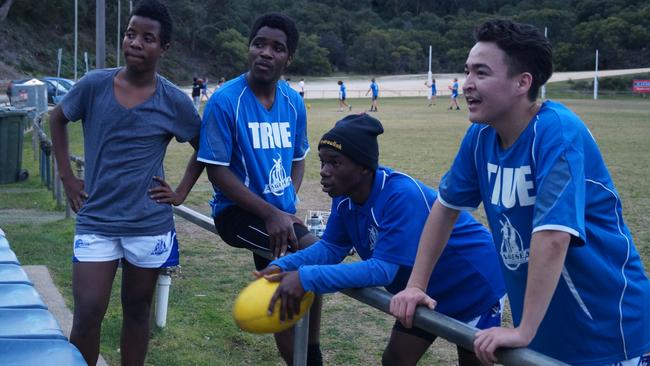
Jamie McKenzie, whose son I played juniors with at Anglesea, is the coach of the U/18 side and his office at the CFA is near the school.
A meeting was called at school to find out who was interested and it went from there.
Their enthusiasm has outweighed their skills to this point and there haven’t been many wins for the Colts team this year with the rules for the new recruits providing a challenge.
They got better once Jamie broke it down in simple terms: When we have got it, go and kick the ball that way. When they have got it, go and get the ball off them.
But what proves the biggest winner is the way it has united the football club and the community.
Getting the boys to training twice a week and then to games on Saturday’s is a major exercise given they live an hour away.
Parents of other kids have stepped in and there’s now a roster for who will pick them up and take them home each week.
And the way they’ve been embraced by the other players is what pulls at Jamie’s heartstrings.
“I feel like I belong to the football club at Angelsea,” Mustafa explains. “I really like the boys, they are respectful, they don’t care where you come from and they welcome us.”
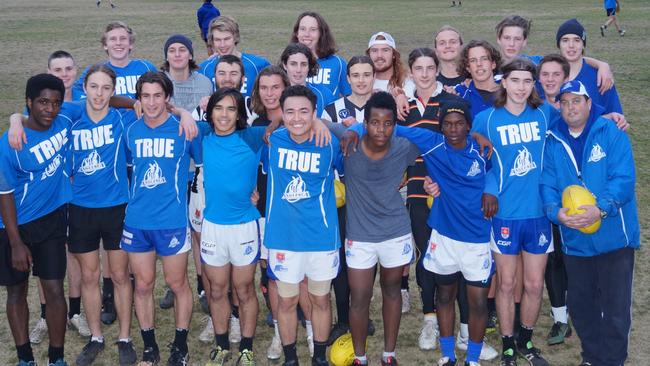
They all went to their first AFL game recently, Geelong v Hawthorn, and are inspired when they see what the likes of Majak Daw, Alir Alir and Bachar Houli are doing.
“It gives us hope,” Mustafa says. “One day we could be there.”
Anglesea isn’t the only club who is helping refugees find Aussie Rules but it’s as much about what these boys are bringing to the community which is the story. And it’s happening in local clubs all around Australia.
It’s opened their eyes to a world they previously knew nothing about.
Wins on the field have been few and far between this season, but perhaps the greatest win this club has had has been in the form of giving these seven young boys an opportunity to be a part of a team, a club and a community. Football clubs bring people together and provide a supportive environment where the likes of Mustafa, Fiston, Abdul, Ayok, La Reh, Hsaynay Moo and Andrew are accepted and appreciated.
It makes people smile, particularly this bunch.
And that is the reason right there, why I love this game.


